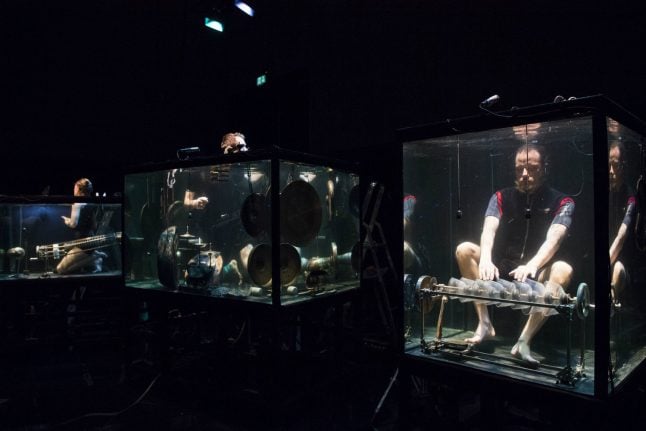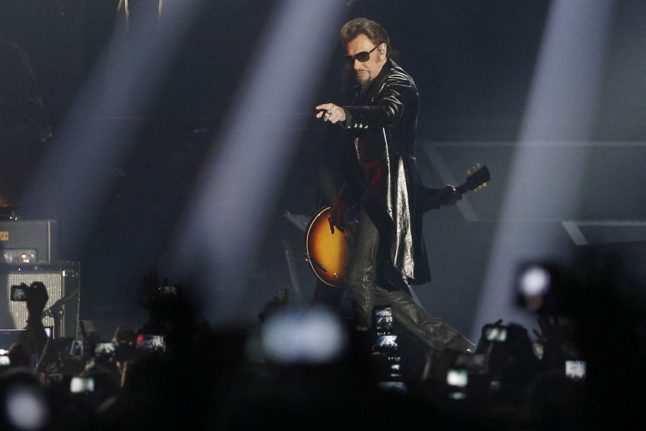In Aarhus, a concert hall at the Godsbanen culture hub looks more like a fish farm than a music set, with its jumble of water tanks, canisters, tubes, pipes and retrofuturistic objects.
One after the other, the five members of the Between Music band — Laila, Robert, Morten, Dea Maria and Nanna — descend into their own individual glass-paned water tanks for their latest project AquaSonic, where they play the violin, cymbals, bells, a crystallophone with a pedal, and a kind of hurdy gurdy with a long neck.
Hydrophones, or special microphones that pick up the sound of the music in the water, amplify the soundwaves, producing music that resembles the sounds whales make.
A pioneer in the field of aquatic music, Laila Skovmand wears several hats with the ensemble: she is artistic director, music and lyrics writer, and vocalist. She sings both underwater and at the water's surface.
Like a siren, her lips at water level, Skovmand releases a captivating chant.
“I'm an educated singer and I wanted to explore new songs. I got the idea that if I sang into the surface of the water I might get some other timbre, some delays, so I tried that,” she explains.
The group collaborates with engineers and makers of musical instruments to develop water-resistant instruments whose sounds respect the harmonies composed by Skovmand.
“There are a lot of musical limitations. There are so many things we can't play because of the struggle with the water, the struggle with the sound, but I think that what the water gives is that special kind of timbre that you can't get in air,” she says.

Photo: Jonathan Nackstrand/AFP
The resulting effect is a sound closer to an accompaniment for Tibetan meditation than it is to chamber music. And it's far from other well-known tributes to water such as Maurice Ravel's “Fountains” or Luciano Berio's “Water Piano”.
While the water transports the sound, it also stifles it and slows it down considerably: the effect is a bit like playing Pink Floyd or Jean-Michel Jarre in slow motion.
Musician and producer Robert Karlsson plays the violin — made of carbon fibre — and the crystallophone, a distant relative of the glass harmonica invented by Benjamin Franklin.
Nanna Bech performs the rotacorda, an instrument inspired by a traditional Byzantine hurdy gurdy. It has six stainless steel strings which can make sound either with a sustained pulling of the string or when fingered.
“It's the only one in the world so I don't even have a teacher. And that's a shame!,” she jokes.
READ ALSO: Danish farmers brew beer from recycled festival guest urine
Skovmand also plays the hydraulophone, a type of underwater organ.
“We want to show that the impossible is possible, to discover a new element with live music,” says Karlsson.
The band spends the entire performance under water, surfacing regularly as part of the choreography to take breaths of air.
 Photo: Jonathan Nackstrand/AFP
Photo: Jonathan Nackstrand/AFP
Ahead of the recent Aarhus concert, the ensemble spent almost six hours in the tanks in one afternoon to prepare for that night's 50-minute performance.
The water is kept at 37°C (99°F).
“We do some diving training, practicing to hold our breath under water,” Bech explains.
And she has developed a special technique to sing under water.
“I can't let the air bubbles get out of my mouth, because they will become bubbles (in the water) and that makes a lot of noise under water. So I can only make short notes.”
For Karlsson, making music in water has a magical effect on him.
“I'm actually not very fond of water personally. I can feel claustrophobic in a bathtub. But somehow when I get into this tank and am playing an instrument, I get calm and really secure,” he says.
Between Music is currently performing AquaSonic across Europe. After a world premiere in Rotterdam last year, the band is now touring Denmark, and will take part in the International Diaghilev Festival in Perm, Russia in May.



 Please whitelist us to continue reading.
Please whitelist us to continue reading.